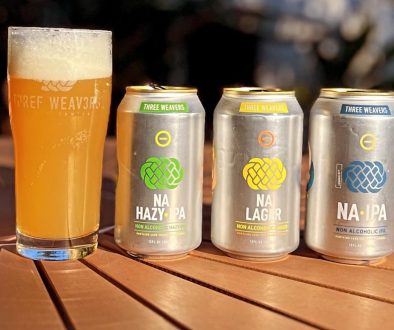Craft Beer in China Makes Promising Progress
China produces more volume of beer than any other country in the world. While that statistic makes a lot of sense when you think about China’s vast landscape and population, on an international scale, China is known for a hell of a lot more than their beer — and the beer that does have a reputation beyond their country is pretty much that light fizzy stuff most beer drinkers pass by in the grocery aisle. That is why I was more than excited to discover China’s burgeoning craft beer community.

I last visited China two and a half years ago. After a lackluster search for good beer, I eventually found myself at Boxing Cat Brewery. When I walked in, there was American football on TV, a waitress rushing by with a plate of wings, and a poster on the wall promoting their recent collaboration with Mikkeller. When you base your travel around food & drink, moments like these never leave you.
I was so thankful to have a real IPA after the first few nights drowned in Tsingtao and other watery local swill. I can still remember being wildly impressed by their Sucker Punch Pale Ale and Donkey Punch Porter; respectively offering bright hop characteristics and a rich malt body. Now, a few years later, it’s great to hear that craft has struck a chord in China. While still not recognized on the global scale, those visiting the major cities (Shanghai and Beijing) can now expect to be immersed in a true beer community. While their growth isn’t as voracious as it is elsewhere (the Italians come to mind), the quality is there and the Chinese are rallying.
I recently caught up with Boxing Cat Brewmaster Michael Jordan (the second in comical beer plus pop culture same-namers) briefly to pick his brain about Chinese craft beer. Jordan is one of many Americans in Shanghai who call China home. Originally from Oregon, Jordan brings to the table professional experience from his tenure at various breweries in the Pacific Northwest including stints as Head Brewer at Grand Teton and Couer d’Arlene Brewing companies as well as Lead Brewer at Widmer Brothers. After some time as the Brewmaster at Brygerriet S.C Fugslang in Denmark, he eventually made his way to Boxing Cat Brewery in Shanghai after their original Brewmaster Gary Heyne’s unfortunate (and unexpected) passing.
From then on, Jordan was given a blank canvas to revamp the brewhouse and Boxing Cat’s existing recipes; forging his way through the country’s limitations with a company eager to advance craft in that region.
“I had to sort things out quickly and luckily had a great support system to navigate the language barriers by my two bosses; Lee Tseng and Kelley Lee,” Jordan said. “ It was a tough road the first six months trying to source imported ingredients but it worked out, and I’ve been able to spread that network to other brewers in China.”
Jordan has been with the company for five years now and oversees their growing staff and three breweries. He explains that when he first started out, their core demographic was deeply rooted in Shanghai’s expatriate community. Over the years, Boxing Cat fans have gravitated more towards a 50-50 split between expats and the Chinese who have become more entranced by the more full-flavored craft beer trend.
“Constant education is key,” Jordan said. “We have several different formats to assist with this whether it’s a beer sampler set, staff training, visual descriptions of beer in dual languages or special events to help teach people about craft beer.”
He continued to tell me about China’s steady craft beer growth and about how there are new players in the mix alongside some of China’s crafty pioneers. Imported craft brands are more frequently hitting tap lists in major cities as well as outside of the metropolitan centers. Shanghai Beer Week turns four this year and Beijing just hosted their first Beer Week this year.
So why haven’t we seen anything from China hit stateside?
Unfortunately for the international beer community, Chinese breweries are still bound by several restrictions that prevent breweries from packaging their beer. This doesn’t just mean a lack of bottles and cans for off-premise consumption, but also kegging and distributing their beer. The way around it? A very difficult, near-impossible license which we’re assuming is limited to some of the bigger operations.
In the meanwhile, Chinese craft beer fans can look forward to their favorite craft operations expanding with multiple outlets (such as Boxing Cat Brewery). The concept of brewpubs (and even homebrewing) is on the rise and the country’s brewers have banded together despite their vast geographic landscape.
Another Chinese craft brewery to know is Great Leap Brewing in Beijing. Founded by two American expats, Great Leap is a similar operation as Boxing Cat. They too, have a small-scale craft production at their multiple brewpubs.
“The overall craft brewing community is very small and it was easy to meet a fellow American brewer when I visited Beijing about four years ago.” Jordan explained. “We did the first collaboration brew in China and have continued to do so twice a year for the past three years.”
Boxing Cat and Great Leap are shining examples of the healthy community and progression of the Chinese palate as they not only bring in hoppy IPAs and rich porters but also the creative spirit of brewing; utilizing traditional Asian ingredients to help bridge a cultural gap. And they’re not just brewing with jasmine rice and Sichuan peppercorns, either. We’re talking beers brewed with exotic spices and teas and even local coffee from neighboring provinces.
Jordan shows much enthusiasm about what is to come for craft beer in China, especially in his home base at Boxing Cat.
“When I first started out in late 2010, our best-selling beer was Right Hook Helles (4.5%)…[in] the past 18 months, it’s switched to [our] TKO IPA (a 6.3% American IPA) — 62 IBUs with a big whirlpool and dry-hop addition of Simcoe and Amarillo hops,” Jordan said. “A radical shift to say the least!”
Have you had a craft beer experience in China? Tell us what you’ve tried in the comments below!




January 14, 2017 @ 1:12 pm
Good article. I go to China multiple times per year and have been to numerous brewpubs. Boxing Cat is by far, my favorite and I hit it up (multiple locations) each time I am in Shanghai. Great Leap is also quite good. Arrow Factory and Slow boat are also good ones in Beijing. Arrow Factory is owned by a Swede, Thomas and the head brewer at Slow Boat has experience similar to Michael Jordan. Two things of note come to mind. First, the local people are rapidly accepting craft beer. What used to be bars filled with expats and tourists is now craft beer bars full of locals with the expats and tourists mixed in. The other thing is that Chinese brewers are still far behind the learning curve. The best breweries/brewpubs are the ones where either Americans or Europeans are brewing the beer. All of the places I’ve been to in China are documented at http://www.globalbeertrekking.com/china.html.
warmsharedaily » Craft Beer in China Makes Promising Progress thefullpint.com
July 27, 2015 @ 6:11 am
[…] While that statistic makes a lot of sense when you think about China’s vast landscape and population, on an international scale, China is known for a hell of a lot more than their beer — and the beer that does have a reputation beyond their country is pretty much that light fizzy stuff most beer drinkers pass by in the grocery aisle. That is why I was more than excited to discover China’s burgeoning craft beer community. Read more… […]
July 25, 2015 @ 9:41 pm
As with any cultural change, unless forced upon people from the barrel of a gun, it takes time. As Mike Jordan said, “Constant education is the key.” In British Columbia, I witnessed, and was a catalyst for, the same shift from a preference for light-flavoured beer to IPA. If what happened after in BC is any indication, craft beer in China is going to explode.
The change that I’m interested in seeing in China is when craft beer becomes localized. It’s starting with the addition of local ingredients to traditional beer styles, as you mentioned above, but almost all brewpubs, taphouses, and restaurants serve only foreign food, even the Chinese-owned ones. Craft beer will truly have arrived in China when we see numerous establishments, like Southern Barbarian in Shanghai, offering a variety of beer styles paired with local Chinese food.